Data Science Programs
May 16, 2023, 1:00 pm
Data science has emerged as a crucial component of scientific research in recent years, and its applications are becoming increasingly widespread in many fields. As a result, data science education has become essential to prepare students for the demands of the modern job market.
This webinar will explore various programs in data science available at universities. From undergraduate to graduate programs, we’ll discuss the unique opportunities each program offers students interested in pursuing a career in data science. Our panel of experts will also provide insights into the job market for data scientists and the skills necessary to succeed in the field. Whether you are an undergraduate student, an educator, or a researcher, this webinar is an excellent opportunity to learn about the importance of data science programs.
The webinar will take place on May 16, 2023, at 1:00 pm EST. The panelists are Peter Alonzi from the University of Virginia, James Hickman from Georgetown University, and Sarah Stone from the University of Washington.
Please register here.

Peter Alonzi is an Assistant Professor of Data Science at the University of Virginia’s School of Data Science. With research interests that span particle physics and the intersection of mental health and the criminal justice system, he is an advocate for cross-disciplinary collaboration. He has partnered with the School of Engineering and Applied Science, the School of Medicine, and the Darden School of Business. Peter has been teaching at the University since 2005, and he has a Ph.D. in Physics from the University of Virginia. In addition to his teaching, Peter has worked at several laboratories, including Fermilab and Oak Ridge National Laboratory.

James Hickman is an Assistant Teaching Professor in the Data Science and Analytics program at Georgetown University. He holds a Ph.D. in Computational-Physics from George Mason University and an M.S. in Engineering-Physics from GMU, and a double major in Physics and Applied Mathematics from Shippensburg University. His research experience includes applying classical atomistic simulations to material science and condensed matter physics problems. He was awarded an NRC postdoctoral fellowship at the National Institute of Standards and Technology (NIST) in Gaithersburg, Maryland in 2018. At NIST, he focused on improving interatomic bonding models for metallic and covalent systems using hybrid models of physically derived approaches and artificial neural networks.

Sarah Stone is the Executive Director of the University of Washington eScience Institute, the campus hub for data-intensive discovery, where she oversees operations and planning; and designs and implements programs and partnerships. Stone is a co-founder and former director of the summer UW Data Science for Social Good (DSSG) program which partners student fellows from across the country with project leads from academia, government, and nonprofits to work on focused collaborative projects for societal benefit. Stone serves as a co-Director for the new Scientific Software Engineering Center (SSEC) at the University of Washington which is building a team of software engineers to work with domain researchers, computer scientists, data scientists, and others to develop high quality, sustainable software for cutting edge research purposes.
Data Science Education, Physics, and Ethics
December 7, 2022, 12:00 pm
From catapults to nuclear bombs, physicists played a central role in new technologies that raise moral questions. With the participation of physicists in the rise of data science and machine learning, we need to think carefully about how to incorporate ethics into the data science education for physicists.
Our panelists discussed the ethical dimension of data science from a physicist’s point of view. The webinar took place on December 7, at 12:00 pm EST. The panelists were Aishik Ghosh from UC Irvine and Berkeley Lab, Ian René Solano-Kamaiko from Cornell University, and Savannah Thais from Columbia University.
Slides of the talks are available by Aishik Ghosh, Savannah Thais, and Ian René Solano-Kamaiko.
Aishik Ghosh is a researcher at UC Irvine and fellow at Lawrence Berkeley National Laboratory working at the intersection of artificial intelligence (AI) and fundamental physics. His research has direct impact on questions on AI bias, fairness, uncertainty quantification and the statistical evaluation of AI models. He has been a strong advocate for including discussions on AI ethics and the limitations of the quantitative methods in data science curricula. As part of a network of AI experts, he has worked with the Organization for Economic Co-operation and Development (OECD) to develop a framework to compare tools for trustworthy AI systems, and continues to work with them on policy related to science and AI. He is concerned about democratic accessibility of technological resources and education required to equitably share the benefits of AI in our society.
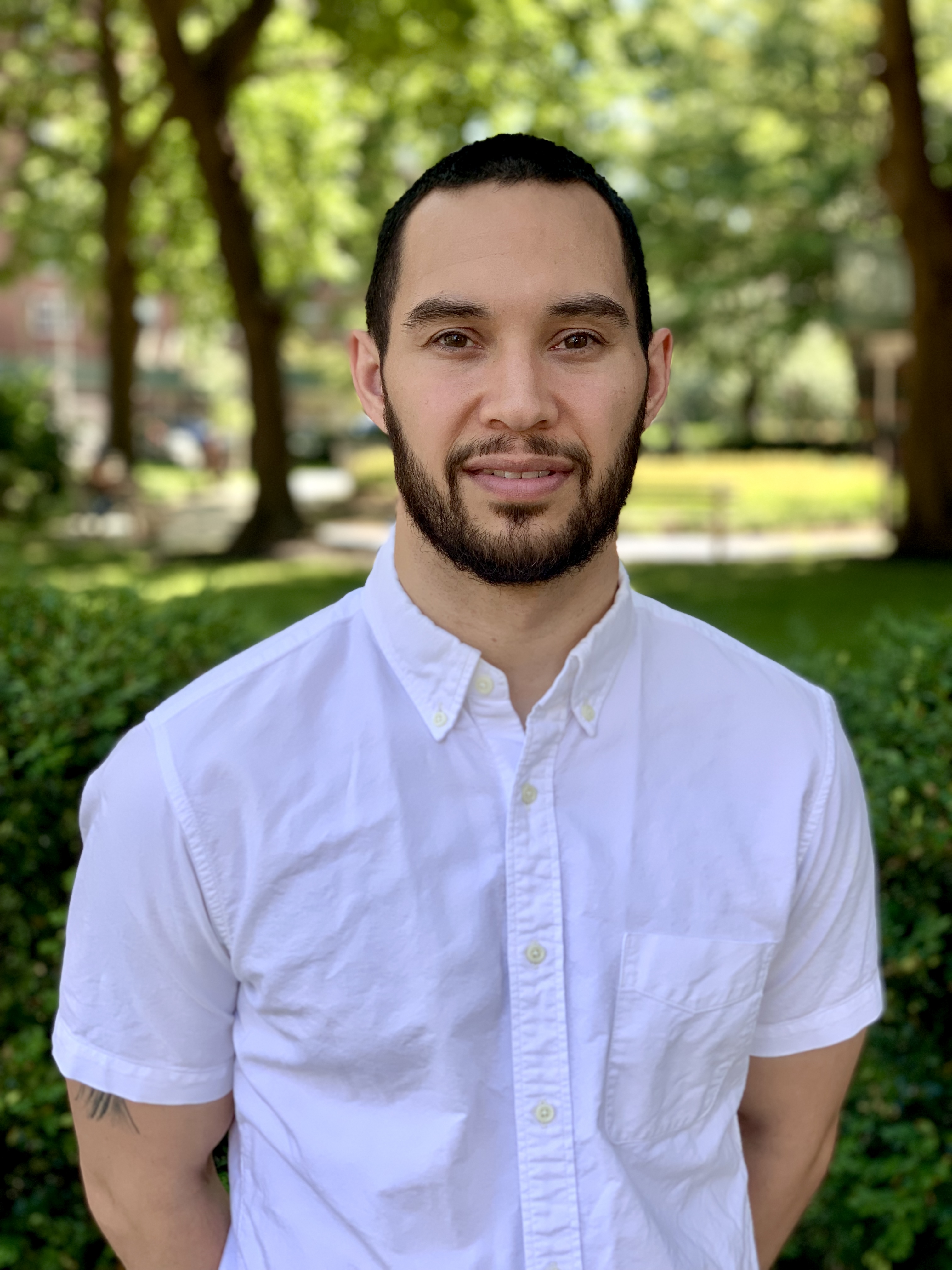
Ian René Solano-Kamaiko is a Ph.D. student in Information Science at Cornell University working with Dr. Nicola Dell and Dr. Aditya Vashistha. His research is focused on building and evaluating computing technologies that aim to improve the lives of underserved and marginalized populations. In particular, he is interested in community and in-home healthcare, automation and the future of work, and climate resilience. Prior to attending Cornell, Ian received an M.S. in Computer Science from New York University where he was a member of the Center for Responsible AI under the supervision of Dr. Julia Stoyanovich.
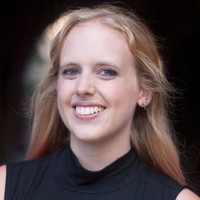
Savannah Thais is a Research Scientist at the Columbia University Data Science Institute where she focuses on machine learning (ML). She is interested in complex system modeling and in understanding what types of information is measurable or modelable and what impacts designing and performing measurements have on systems and societies. This work is informed by her background in high energy particle physics and incorporates traditional scientific experiment design components such as uncertainty quantification, experimental blinding, and decorrelation/de-biasing methods. Her recent work has focused on geometric deep learning, methods to incorporate physics-based inductive biases into ML models, regulation of emerging technology, social determinants of health, and community education. She is the founder and Research Director of Community Insight and Impact, an non-profit organization focused on data-driven community needs assessments for vulnerable populations and effective resource allocation. She is passionate about the impacts of science and technology on society and is a strong advocate for improving access to scientific education and literacy, community centered technology development, and equitable data practices. She was the ML Knowledge Convener for the CMS Experiment from 2020-2022, currently serves on the Executive Board of Women in Machine Learning and the Executive Committee of the APS Group on Data Science, and is a Founding Editor of the Springer AI Ethics journal. She received her PhD in Physics from Yale University in 2019 and was a postdoctoral researcher at Princeton University from 2019-2022.
Data Science Career Paths in Industry for Physicists
September 14, 2022, 12:00 pm
The webinar took place on Wednesday, September 14, at 12:00 pm. The panelists were Jamie Antonelli from Blue Cross Blue Shield, Tony Chu from ECS, Nima Dehmamy from IBM Research, and Jennifer Hobbs from Intelinair.
The panelists talked about their experience as data scientists in private industry and discussed how the physics education prepared them for their careers. The discussion also highlighted skills and knowledge undergraduate physics majors need for data science careers.
Due to technical difficulties, Jamie Antonelli was not able to share his slides during the webinar. You can find his slides here.

Jamie Antonelli is a Senior Manager of Data Science at Blue Cross Blue Shield of Illinois, where he leads a cross-functional team responsible for a growing suite of predictive models focused on patient outcomes (hospital readmissions, high cost claimants, disease progression, etc.). He also heads the committee tasked with providing technical peer review for all prediction solutions across the enterprise. Prior to BCBS he worked at Vizient, a national leader in health care performance improvement. In a past life he was a particle physicist and helped discover the Higgs Boson in 2012 along with 6000 of his closest friends. He has two decades of technical mentoring experience and is passionate about helping anyone who will listen to grow their skill sets and develop as competent and insightful data professionals.

Tony Chu will be serving as an Artificial Intelligence Technical Advisor at the Johns Hopkins University Applied Physics Laboratory. He has led a variety of data science efforts in both the government and commercial sectors while working at ECS Federal, Citibank, Accenture, and the Center for Naval Analyses. Prior to that, he was a postdoctoral researcher in the field of numerical relativity at Princeton University and the Canadian Institute for Theoretical Astrophysics. He holds a PhD in theoretical physics from Caltech, and a BA in physics from Cornell University.

Nima Dehmamy is a Research Staff Member at IBM Research in Cambridge MA. His work is at the intersection of physics, machine learning and complex systems, including machine learning for science, graph learning, optimization and computational social science. His works on properties of 3D embedded graphs were featured on the covers of Nature magazine and Nature Physics. In the past, he has worked on a broad spectrum of topics such as black hole physics, financial networks and condensed matter physics. Prior to IBM, he was a research professor at the Center for Science of Science and Innovation at Northwestern University and a postdoctoral fellow at the Barabasi Lab at Northeastern University. He received his PhD in physics from Boston University in 2016 and his BSc and MSc in physics from Sharif University, Iran.

Dr. Jennifer Hobbs is the Director of Machine Learning at Intelinair, an ag-tech startup where she leads an international team of researchers and engineers in developing machine learning models to provide insights to farmers. She is the lead organizer of the CVPR Workshop Agriculture-Vision. As an undergraduate at Northwestern University, she majored in Physics, Math, and Integrated Science and conducted research on the MINERvA Experiment at Fermilab. Jennifer completed her PhD in Physics and Astronomy at Northwestern where she conducted research on the statistical properties and neural coding of tactile signals. Throughout her career she has been involved in all phases of the machine learning lifecycle, transforming raw data into compelling technology products through data modeling and architecture, pipeline design and management, machine learning, and visualization. Jennifer has given numerous talks, sat on panels, and written articles on leveraging one’s physics training for a career in machine learning and data science. She has also been engaged in numerous organizations including APS, the Northwestern Center for Teaching Excellence, the Northwestern Residential College System, Rotary International, Society for Women Engineers (SWE), and Women in Machine Learning (WiML).
Data science in physics courses at undergraduate-focused departments
May 25, 2022, 1:00 pm
Curious what data science and physics looks like when the physics department primarily serves undergraduates? This webinar is for you! Our presenters discuss how they include data science in their undergraduate physics courses, providing examples of what they did and sharing lessons learned.
The webinar took place on Wednesday, May 25th, at 1:00 pm. The moderator was the PI of the program, William Ratcliff. The panelists were Matthew Bellis from Siena College and Amy Roberts from UC Denver.
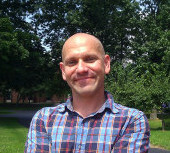
Matt Bellis is an Associate Professor in Siena College’s Department of Physics and Astronomy and the coordinator for Siena’s Data Science program. He received his PhD from Rensselaer and came to Siena in 2012 after research associate positions at Carnegie Mellon, Stanford, and Northern Illinois University. He has conducted primarily particle physics research with the CLAS and GlueX experiments at Jefferson Lab, BaBar at SLAC, and now with the CMS experiment at the LHC. He is passionate about education and outreach and how data science can be leveraged for social good. He has engaged with students on sports analytics, mathematics and machine learning, and has a long-standing collaboration with other faculty and community groups exploring the allocation of resources to support homeless individuals and families.

Dr. Amy Roberts is an Assistant Professor in the Physics department, where she searches for “dark matter” with specialized detectors. Although gravitational measurements suggest this “dark matter” makes up fully 80% of the universe’s mass, it has never been directly detected. Dr. Roberts is a member of the Cryogenic Dark Matter Search collaboration (SuperCDMS), which specializes in sensing the faintest possible signals from highly-sensitive phonon detectors. Her work focuses on understanding the detector response at low energies, novel signal analysis, and the data acquisition and software tools needed to keep specialized detectors running optimally.
Teaching data science to physicists
March 4, 2022, 10:30 am
Webinar on Friday, March 4th, at 10:30 am to discuss teaching data science to physicists and material scientists. In this hour-long webinar, the panelists presented strategies and challenges of incorporating data science into physics curricula for students and researchers from all backgrounds. They provided guidance on how to best implement data science and machine learning in physics teaching and research.
You can watch a recording of the webinar below.
The webinar was moderated by the PI of the program, William Ratcliff. The panelists were Boris Kozinsky from the Harvard School of Engineering and Applied Sciences, Aaron Gilad Kusne from the National Institute of Standards and Technology, Federica Bianco from the University of Delaware, Trevor David Rhone from the Rensselaer Polytechnic Institute, and Mohammad Soltanieh-Ha from Boston University.
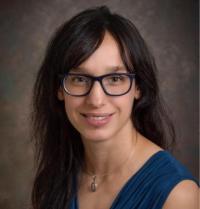
Dr. Federica Bianco is an Assistant Professor at the University of Delaware in the Department of Physics and Astronomy and in the School of Public Policy and Administration and a Resident Faculty in the Data Science Institute. She works on data-driven solutions to problems that span from the nature of explosions in the sky to delays in the justice system. She studies lightcurves, time series of light, in astronomy to understand stellar evolution, in the urban environment at the Urban Observatory, where the study of urban lightcurves enables sociological, ecologic, economic inference, and in many other interdisciplinary adventures. Her pedagogy is focused on teaching Data Science across domains and to people from all backgrounds.

A. Gilad Kusne received his B.S., M.S., and Ph.D. degrees from Carnegie Mellon University. He is a Staff Scientist with the National Institute of Standards and Technology (NIST), Gaithersburg, Maryland, and an adjunct professor with the University of Maryland. His research is part of the White House’s Materials Genome Initiative at NIST, a project which aims to accelerate the discovery and optimization of advanced materials. He leads the machine learning team of an international, cross-disciplinary effort building autonomous research systems, with the goal of advancing solid state, soft, and biological materials. For these systems, machine learning performs experiment design, execution (in the lab and in silico), and analysis. For his work, he has been awarded the NIST Bronze Award (highest NIST award). He is also the lead founder and organizer of the annual Machine Learning for Materials Research Bootcamp and Workshop—educating next generation and mid-career material scientists in machine learning.
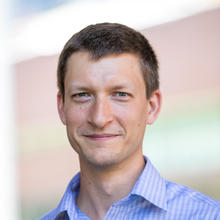
Boris Kozinsky is the Thomas D. Cabot Associate Professor of Computational Materials Science at the Harvard School of Engineering and Applied Sciences. He studied at MIT for his B.S. degrees in Physics, Mathematics, and Electrical Engineering and Computer Science, and received his PhD degree in Physics also from MIT. He then established and led the atomistic computational materials design team at Bosch Research in Cambridge MA. In 2018 he started the Materials Intelligence Research group at Harvard that works at the intersection of fundamental materials physics, computational chemistry, and data science. His group develops and uses atomistic and electronic structure computations and machine learning for understanding and predicting quantum-level microscopic effects, particularly ionic, electronic and thermal transport and transformations in materials for energy storage and conversion. His work on the development and application of computational methods led to computation-driven design of materials in a wide range of materials systems, including 1D and 2D materials, piezoelectrics, thermoelectrics, batteries, superionic conductors, catalysts, and functional polymers.

Trevor David Rhone received a liberal arts education from Macalester College. He received his PhD from Columbia University where he studied of two-dimensional electron systems using light scattering. Rhone spent several years at NTT Basic research laboratories in Japan where he received the BRL director award. While working at the National Institute of Materials Science in Tsukuba, Japan, he transitioned to materials informatics – an emerging field of research combining materials science and machine learning. He continued this work at Harvard University as a postdoctoral prize fellow where he used machine learning to search for new two-dimensional magnetic materials.
Rhone is presently an assistant professor at Rensselaer Polytechnic Institute. His research interests are at the intersection of materials science and artificial intelligence. His research aims to understand emergent phenomena in electron systems, with an emphasis on spin degrees of freedom in two-dimensional materials. He recently received the NSF CAREER award for research in materials intelligence.

Mohammad Soltanieh-ha is a Clinical Assistant Professor at the Information Systems department at Boston University’s Questrom School of Business. Mohammad obtained his Ph.D. in computational physics in 2015 from Northeastern University where he studied strongly correlated electronic systems in low dimensions. His current research interest revolves around computer vision applications in automating cancer diagnosis as well as large-scale high-performance computing. His teaching experience includes data science programming, big data analytics, and applications of data science in business.Mohammad has leadership roles at Google and American Physical Society (APS). In 2019, he founded a data science unit within APS and is currently the chair. Additionally, he is a Faculty Expert at Google Cloud, where he advocates for cloud computing education and helps other faculty members with best practices.